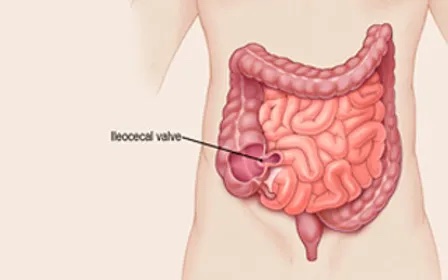The human body is a complex and intricate system of interconnected parts, each playing a crucial role in maintaining overall health and well-being. One such lesser-known but essential component is the ileocecal valve (ICV). Situated at the junction of the small intestine and the large intestine, this valve regulates the passage of digested food, prevents backflow, and plays a pivotal role in gut health.

When the ICV malfunctions, it can lead to discomfort and digestive issues. In this blog, we’ll delve into the world of the ileocecal valve, its importance, common issues, and how systematic kinesiology can offer potential solutions.
A malfunctioning Ileocecal Valve is an extremely common condition
It can produce an unbelievable list of distressing symptoms that may be seemingly unrelated. Therefore, it is frequently the cause of the “I just don’t feel well” syndromes, as well as many types of aches and pains together with other specific symptomatic patterns.
Understanding the Ileocecal Valve
The ileocecal valve serves as a gateway between the small intestine (ileum) and the large intestine (cecum). Its primary role is to control the flow of digested food, waste, and bacteria from the small intestine into the large intestine. This function prevents backflow, ensuring that waste material doesn’t re-enter the small intestine, which could lead to bacterial imbalances and potential health problems.
Common Issues with the Ileocecal Valve
When the ileocecal valve malfunctions, a range of symptoms can occur. These may include bloating, gas, abdominal discomfort, irregular bowel movements, and even more severe issues such as inflammatory bowel disease (IBD) or irritable bowel syndrome (IBS). Stress, poor diet, dehydration, and certain medications are among the factors that can contribute to the dysfunction of this valve.
Systematic Kinesiology is a truly wholistic system using the M.C.P.E approach which address the person as a whole. Below are the four main areas from where the ICV can be affected:
THE MIND (Mental) – Relentless stress, negative emotions/thoughts, upset and arguments, fears, phobias, pressures and anxieties. They all have a psychosomatic effect on the body. The psyche (mind) directly affects the body (soma). Similarly we can also relate to a “Gut reaction” when emotions are involved. Kinesiology can help negative feelings and emotions through a technique called ‘Emotional Stress Release’
THE CHEMISTRY (Chemical) – The digestion of food. Too much raw food, roughage like bran, alcohol in excess, caffeinated drinks, crisps, nuts and even whole grains can cause the ICV to malfunction. Allergies, food sensitivities and a lack of stomach acid (often feels like too much acid with reflux) also can contribute to problems with the ICV. With Kinesiology we are able to test possible offending foods and check for specific nutritional needs.
THE PHYSICAL BODY (Physical) – Feeling over tired due to straining the structure of the muscles, bones and organs, or lack of exercise and over exercising can therefore also upset the smooth functioning of the digestive system.
THE LIFE FORCE, OUR BODIES ENERGY (Energetical) – The fourth, often neglected vital part of us is our LIFE FORCE. Phones, tablets, PC’s, and microwaves can cause negative energy excesses and deficiencies. Electro-magnetic pollution can affect our digestion.
Systematic Kinesiology and the Ileocecal Valve

Systematic Kinesiology focuses on identifying the underlying causes of dysfunction. This might include imbalances in any or all of the M.C.P.E areas. An imbalanced ICV can have far-reaching effects on the body, making it a significant area of focus during kinesiology sessions.
Practitioners use muscle testing techniques to assess the body’s response to different stimuli. For the ileocecal valve, they may test specific muscles associated with the valve’s function. If the muscle test indicates weakness or stress, it could point to an issue with the valve itself or related factors. Luckily, an ICV imbalance can be easily identified and corrected through simple testing and corrective techniques.
It’s intriguing to note that an imbalanced ICV can often be linked to discomfort or sensations experienced in other areas of the body. This interconnection underscores the pivotal role the ICV plays in maintaining overall bodily harmony.
The ileocecal valve might be a small component of the digestive system, but its role in maintaining overall health is undeniable. When this valve malfunctions, it can lead to a range of uncomfortable symptoms and potential health issues including:
- Abdominal pain, (grumbling) appendix and acne.
- Bloating, blurred vision, body odour
- Chronic fatigue, colitis, constipation
- Dehydration, depression, dizziness and digestive disorders
- Elbow pain
- Frozen Shoulder, flu symptoms, fatigue and general lethargy
- Gas, Gurgling (excessive) and groin pain
- Headaches, hip pain-particularly on the right, hypochlorhydria (stomach-acid problems)
- Indigestion and irritable bowel syndrome (IBS)
- Knee pains, small joint pain
- Lower back pain, Lethargy – M.E. failure to recover from (Post Viral Syndrome)
- Migraines
- Nausea and nervous debility
- Oedema
- Pallor grey/white complexion, palpitations or feeling of heart flutter. Post nasal drip, post-viral syndrome
- Skin problems-exacerbates eczema or psoriasis. Spots, stiff neck-from toxins in weak upper trapezius. Sudden low back pain -“I only bent over to pick up a pencil!”. Shoulder pain, shoulder joint pain-particularly on the right
- T.A.T.T. (Tired all the time syndrome). Thirst, sudden or excessive. Thrush, tinnitus-ringing or whistling noises in the ear.
- Water retention
Kinesiology, with its holistic approach, offers a unique perspective on addressing ileocecal valve dysfunction by identifying and correcting energy imbalances, reducing stress, and supporting the body’s natural healing processes.
A skilled Kinesiologist can test to see if the ICV is involved and if so, they can rebalance it.
Search for your nearest Systematic Kinesiologist
To search for your nearest Kinesiologist go to our sister website TASK-UK Network where we have an online directory of highly trained Professional Kinesiologists that could help.
Or you can call TASK-UK NETWORK on 020 8391 5988 to discuss you needs.
Train in Systematic Kinesiology
Would you like to learn the knowledge and tools of Kinesiology that will empower you to be in control of your own health and well being? TASK is the largest and longest established Kinesiology academy in Europe, providing the highest quality training to thousands of people. Foundation Courses run twice a year, details can be found here >>>